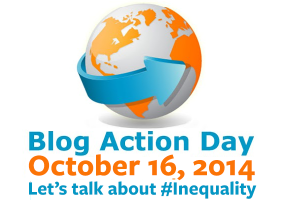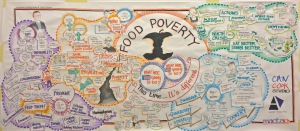
After my last post about Kate Pickett’s lecture on the Spirit Level, Liam Purcell from Church Action on Poverty told me that their current campaign to Close the Gap was inspired by this research. I’ve been following and supporting this campaign, so I thought I would write a piece all about it.
The Spirit Level investigates how the relationship between a country’s economic growth and the health and wellbeing of its citizens breaks down once a country reaches a certain level of income. The UK has reached this level – until the recession the UK was getting richer but not healthier or happier. Other things were making a difference, and the Spirit Level research demonstrates that differences in income inequality between countries can account for differences in health and wellbeing. Not only this, but reducing income inequality brings benefits not only for the poorest people in a society, but for every sector of the population.
Church Action on Poverty is campaigning to Close the Gap between rich and poor. This would not only transform the lives of those on the lowest incomes, people who Church Action on Poverty works with on a regular basis, but would also make our whole society fairer, happier, healthier and safer. The campaign focuses on four areas: fair taxes, fair pay, fair prices and fair say.
Fair Taxes
Anyone who knows me IRL knows I’ve been campaigning with Church Action on Poverty and Christian Aid on tax since the tax bus came to town! We’ve all been pretty annoyed that Starbucks, Google and Amazon, to name but a few, seem to be able to operate and make profits in this country without paying their fair contribution to the infrastructure which makes their operations possible. Christian Aid also offers a perspective from poorer countries. If we need company taxes to help our economy, how much more important are they in countries with smaller incomes and bigger needs? Tax was a key part of the recent IF campaign, calling for the closure of tax havens loopholes, disclosure of information between tax jurisdictions, and a public register of who really owns companies (beneficial ownership) so money can’t be hidden and citizens can hold businesses to account. We have really put tax on the table, and just in the last few days, the Prime Minister announced that the UK would publish a register of beneficial ownership and that this register would be public and not just for the tax office. Now Europe and the US needs to follow suit.
More needs to be done to close loopholes and tax havens, and Church Action on Poverty is asking for a re-think on tax. It is part of belonging together to contribute to the welfare of all. This is true for businesses and individuals, and we need to build a fair and transparent taxation system that reflects this attitude. If you want to see more about how the UK is still hiding money and how companies in the City of London are not paying their fair share, come and see the film The UK Gold, being screened in Liverpool on 21st November 2013.
Fair Pay
Did you know that this week is Living Wage week? Do you even know what a Living Wage is? It is calculated independently of governments in this country by the Joseph Rowntree Foundation (yes, originally the chocolate guy) and is the hourly rate someone working full-time would need to be paid in order to reach what the public considers to be an acceptable standard of living. At £7.65 an hour (£8.80 in London) it is considerably more than the minimum wage of £6.31 (no London rate).
Those who criticise the Living Wage suggest that it would be too expensive to implement and would put people out of business. The first thing response is to remind people that the Living Wage is voluntary and functions as a standard to aspire to. But in case you think that is a cop out, from the reading I’ve done, those organisations which have implemented it have found that improvements in productivity and reductions in sick pay have more than outweighed the cost. I guess it depends how low your starting point is, but the same argument was raised when the minimum wage was introduced, and there was no corresponding increase in businesses going to the wall.
In fact, introducing a Living Wage looks like it would actually save the government money. A new report from think tanks IPPR and the Resolution Foundation suggests that paying everyone at least the living wage would save the government £2.2 billion a year because of a reduction of in-work benefits and an increase in tax and NI contributions, even taking into account the fact that it would be spending more on paying public sector workers. This is something that has vexed me for a while. The Government is effectively subsidising industries which pay low wages, which includes in particular retail and care. There are plenty businesses in these sectors making handsome profits. By topping up low pay, the Government makes low pay a sustainable option and allows it to continue, while supermarkets (for example) continue to rake it in. The solution is not to cut in-work benefits but improve pay, as is beautifully described in this article by Polly Toynbee. She also says “For the long term, power needs to flow back towards the utterly powerless employee. A German-style seat on the board, as well as on the remuneration committee, helps contain top greed…Companies should be obliged to publish their pay ratios, from top to bottom.”
This is the second strand of Church Action on Poverty’s fair pay demand. We need to question whether huge salaries paid to anyone are justified or acceptable. It is not just a question of whether someone is worth it, but rather is it fair or just that in our society there is such discrepancy in pay. There needs to be a shift in attitudes so that pay ratios between the highest and lowest paid workers of 100:1 or even 200:1 are no longer acceptable.
Fair prices
Working with people on low incomes as a debt adviser has really opened my eyes to just how expensive it is to be poor. My dual fuel, pay by direct debit, paperless billing discounts are not available to someone who has to use a pre-pay gas or electricity meter because they are having difficulty meeting their bills. The weekly shop is also much more expensive if you have no transport to the big out-of-town supermarket and have to rely on local shops. Even the buy two get one free offers are out of reach on a low income, never mind carrying all that extra stuff home on the bus!
Another big issue is the cost of credit, significantly more if you are on a low income, and harder to obtain. This is why door-step lenders, payday loan companies and hire-purchase businesses are thriving, because if there’s nowhere else to borrow money and your washing machine has packed in, what else are you going to do? The cost of borrowing like this is astronomical, there is no limit on the fees and charges added on by lenders, and very little checking up on whether a borrower has the ability to repay. If you get behind with your repayments, or “roll-over” your loan for another month, the debts very quickly mount up and become unmanageable and unpayable.
Church Action on Poverty is calling on businesses to stop charging premium rates to their poorest customers and instead introduce social tariffs. United Utilities, water providers in the north west, already do this, and it is an enormous help to some of the people who have come for debt advice. Church Action on Poverty is also calling for a cap on the overall charges which can be levied by lending companies. Regulation for payday lenders is being discussed right now, so if you want to add your voice to calls for fairer lending, you can sign this petition.
Fair Say
How easy it has been for society to slowly but definitely increase the gap between rich and poor, and make life more and more difficult for those at the bottom of the heap. It is easy because those at the bottom lack power. Those with the money not only have power over business and policy decisions, but also over what you get to hear about, what gets discussed in the media, and the way we think about those who have not. Church Action on Poverty works with poor communities, not just to alleviate their needs, but also to give them a voice, to be able to advocate for themselves and bring about their own transformation.
I know I sound like an old-school leftie, battling against the hegemony of the establishment, as if we were lost in 1984 (the novel not the year) with the thought police. But I challenge you to read that report I mentioned in the last post – Poverty: Truth and Lies. And when you’ve read it, then tell me that those in power are not controlling the discourse.

 I don’t usually get into church politics on here. I prefer to stick to the real thing. While we in the church are arguing with each other, we are not building the kingdom. We are not being salt and light, or good news, or transforming lives, communities or the world we live in.
I don’t usually get into church politics on here. I prefer to stick to the real thing. While we in the church are arguing with each other, we are not building the kingdom. We are not being salt and light, or good news, or transforming lives, communities or the world we live in.
 Presumably, this is going to cost money, which apparently we don’t have, and it’s unclear where we’re going to find it, as the Queen’s Speech also promises “no rises in income tax rates, value-added tax or national insurance for the next five years”. Nor does it offer any measures to tackle tax dodging, despite this being a manifesto promise.
Presumably, this is going to cost money, which apparently we don’t have, and it’s unclear where we’re going to find it, as the Queen’s Speech also promises “no rises in income tax rates, value-added tax or national insurance for the next five years”. Nor does it offer any measures to tackle tax dodging, despite this being a manifesto promise.




